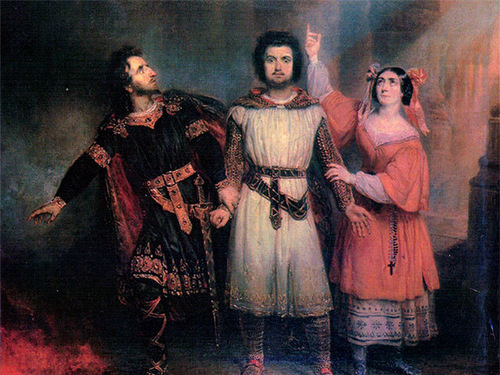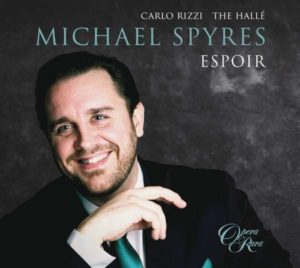Mit besonderer Freude registriert man das Porträt Espoir von Michael Spyres bei Opera Rara, das sich Espoir nennt und der Kunst des bedeutenden französischen Tenors Gilbert Duprez (1806 – 96) gewidmet ist (ORR251). Im Einführungstext nennt Spyres den legendären Sänger „einen mythischen Interpreten, der erstmalig in der Geschichte des Gesangs die Bruststimme über das passaggio führte und der gleichermaßen ein heroischer wie ein lyrischer Tenor war“. Spyres interpretiert in seiner Auswahl Partien, die der Franzose kreiert oder häufig gesungen hat. Das Programm beginnt mit Otellos triumphaler Auftrittsarie ”Venise, o ma patrie“ aus Rossinis Oper. In der originalen italienischen Version hatte Duprez anfangs den Rodrigo gesungen, später wechselte er (in der französischen Fassung) zur Titelfigur. Daher wählte auch Spyres für seine Hommage diese Variante und demonstriert darin sogleich die Meriten seiner Gesangskunst. Da ist der außergewöhnliche Umfang des Tenors mit warm und männlich timbrierter Mittellage, über der sich die strahlende Höhe aufbaut, noch gekrönt von spektakulären und mühelos absolvierten Extremnoten. Und da ist die stupende Flexibilität der Stimme, unerlässlich für Rossinis hybride Koloraturgirlanden.

Michael Spyres: „Robert le Diable“ – Finaltrio mit Lavasseur, Duprez und Falcon/ Wikipedia
Es folgt Enricos Auftritt „Dopo i lauri“ aus Donizettis Rosmonda d’Inghilterra, in der Duprez bei der Premiere in Florenz 1834 an der Seite von Fanny Tacchinardi Persiani als Titelrollensängerin mitgewirkt hatte. Beide standen auch bei der Uraufführung der Lucia ein Jahr später in Neapel gemeinsam auf der Bühne. Spyres beginnt mit einer gewichtigen Kantilene, die in einen rhythmisch betonten Teil überleitet, und kann hier die Pracht seiner Stimme gebührend ausstellen. Eine Weltpremiere auf CD bedeutet die Arie des Guido aus Halévys Oper Guido et Ginévra, die 1838 in Paris mit Duprez und Julie Dorus-Gras (1805 – 96) zur Premiere kam. Es ist ein Stück von düster-beklommener Stimmung, denn Guido trauert an Ginévras Grab, was Spyres mit schmerzlicher Tongebung verdeutlicht.
Der französischen Sängerin Julie Dorus-Gras mit belgischen Wurzeln ist ein Recital gewidmet, das Joyce El-Khoury eingesungen und Echo betitelt hat (ORR252). Sie und Spyres singen aus Halévys Oper Guido et Ginévra noch das ausgedehnte Duett „Tu seras donc pour moi“, welches die schwärmerische Melodie von Guidos Arie aufnimmt und die Stimme des Tenors dann bis zum hohen D führt. Die Sopranistin stimmt ein und vereint sich mit Michael Spyres in einem dramatischen Schlussteil von schlagender Wirkung.

Gilbert Duprez und Rosine Stoltz in „La Favorite“/ Wiki
Verdis Jérusalem als Revision seiner Lombardi kam 1847 an der Pariser Opéra mit Duprez als Gaston heraus. In dessen Arie „L’infamie! Prenez ma vie!“ vor seiner geplanten Hinrichtung wird dem Sänger ein weites Spektrum an Ausdrucksvielfalt abverlangt und Spyres bewältigt diese Anforderung mit emphatischem Gesang bezwingend.
Eigens für die Pariser Opéra geschrieben war Donizettis letztes Werk Dom Sébastien, das 1843 mit Duprez in der Titelrolle herauskam. Dessen elegische Arie „Seul sur la terre“ am Ende des 2. Aktes bietet dem Interpreten die Möglichkeit für hohe D’s und Spyres absolviert sie glanzvoll. Duprez stand auch in der Besetzungsliste bei der Uraufführung von Aubers Le Lac des fées in Paris 1839. Die Arie des Albert „Gentille fée“ erzählt von seiner Liebe zu der Fee Zeïla, was Spyres mit passioniertem Ausdruck und tenoralem Wohllaut umsetzt.

„La Reine de Chypre“: Gilbert Duprez war der Gérard der Uraufführung/ Foto Nadar/ Taschen
Die Titelrolle in Berlioz’ erster Oper Benvenuto Cellini war bei der Kreation in Paris 1838 ein weiterer Meilenstein in der Karriere von Duprez. Wiederum stand Dorus-Gras an seiner Seite. In der Arie „Sur les monts“ singt Cellini von seiner bevorstehenden Verurteilung zum Tode, nachdem er einen Menschen getötet hat. Spyres kann in dieser Nummer von pastoralem Stil mit schönen legato-Bögen sowie am Ende mit bravourösem Aufstieg in die exponierte Lage aufwarten. Zwei Jahre später kreierte Duprez an der Opéra die Rolle des Fernand in Donizettis La Favorite. Die berühmte Arie „Ange si pur“ ist eine Erinnerung an seine einstigen Gefühle für Léonor, nachdem er von deren Vergangenheit als Mätresse des Königs erfahren hat. Tenöre wählen dieses Stück gern für ihre Arien-Abende, auch Spyres hat es schon oft gesungen und glänzt in dieser Einspielung wiederum mit inbrünstigem Ausdruck und mirakulösen Topnoten.
Die heute nahezu unbekannte Oper La Reine de Chypre war 1841 ein weiterer Erfolg für den Komponisten Halévy und den Tenor Duprez in der Partie des Gérard. Dessen Arie „De mes aïeux ombres sacrées“ beginnt mit einer deklamatorischen Passage, die in das überschwängliche und mit Spitzentönen gespickte „Il est temps“ übergeht. Spyres beweist damit auch sein dramatisches Potential. Er beendet die Auswahl von höchstem Anspruch mit einer Referenz-Interpretation von Edgardos „Tombe degl avi miei“ aus der Lucia, wo er vom Hallé Orchestra sehr atmosphärisch begleitet wird, und würdigt damit noch einmal den legendären Interpreten der Uraufführung. (Und man wartet ungeduldig auf die Neuaufnahme der Berlioz´schen Troyens bei Warner aus Strasbourg, laut Programmheft absolut jede Note des Werkes! Foto oben: Ausschnitt aus dem Cover der neuen CD bei Opera Rara/ Marco Borelli) Bernd Hoppe

Michael Spyres recording „Espoir“/ Foto Marco Borelli/ Opera Rara
Und nun ein Interview, das Katherine Cooper von der englischen Verkaufsplatform Presto Classical (dem britischen Pendant zu jpc und Amazon) mit Michael Spyres anlässlich seiner neuen CD bei Opera Rara geführt hat. Wir danken der Autorin und Presto Classical – und arbeiten an einer deutschen Übersetzung!
Vis-à-vis Michael Spyres: The maverick American tenor Michael Spyres is everywhere this autumn – he appears on John Eliot Gardiner’s imminent recording of Mendelssohn’s Lobgesang with the London Symphony Orchestra, and sings the hugely demanding role of Énée on John Nelson’s long-awaited recording of Berlioz’s Les Troyens (due out on Erato on 24th November – I’ve just listened to a preview copy of Part One, and his performance is electrifying).
But first and foremost is his debut solo disc of opera arias, Espoir (released this Friday on Opera Rara in tandem with Joyce El-Khoury’s Écho, which we featured last week and on which Michael also appears), exploring the short but extraordinary career of the Parisian tenor Gilbert Duprez (1806-96). Commonly credited as the first tenor to sing high Cs in full resonance, Duprez revolutionised the way that composers including Donizetti, Halévy and Berlioz wrote for the voice and originated roles including Benvenuto Cellini, Edgardo in Lucia di Lammermoor and Polyeucte in Les Martyrs (which Spyres recorded for Opera Rara to great acclaim in 2015).
I met up with Michael on the afternoon of his final performance in the title-role of Mitridate at the Royal Opera House in July, where he talked to me at length about Duprez’s critical role in the evolution of the tenor voice as we know it today and the remarkable music which his vocal pioneering inspired.

Michael Spyres und Joyce El-Khoury/ Foto Marco Borelli/ Opera Rara
How and when did you hit on the idea of a tribute to Gilbert Duprez, and what made him such an influential figure in the history of singing? Because of the way that Opera Rara has developed in the last two years, we have that little bit more freedom. After the success of Les Martyrs and Le Duc d’Albe, they suggested that Duprez would fit me really well, and when I started looking into him I thought ‘Wow, he really was one of maybe five tenors in history that just changed everything’. He started his career as a light lyric, but after studying in Italy he learned a different way of production and acquired a larger sound – he’d discovered how to change the vocal formants to just power through the orchestra, so people started writing for him to capitalise on that.
It’s not that no-one had done this kind of thing at all as a one-off in the past: Manuel Garcia (who came 20 years before Duprez) and some of his colleagues were already singing high Cs in full chest, but the repertoire they sang wasn’t actually written that way. Duprez’s great innovation was that he’d developed a technique to actually sustain this crazy tessitura: Donizetti and the composers immediately afterwards realised they could change the way they wrote for the voice entirely. And those early performances must’ve been pretty scary for Duprez, because the whole world was against him: that entire generation of opera-goers were used to hearing things sung a certain way, and he came along and completely confounded the audience’s expectations. It’s almost the opposite now: if you were to sing ‘Di quella pira’ with a voix mixte on the high C these days, people would boo and think it was the worst thing in the world!
Duprez was in great demand for a couple of years, but it wore on him: when was my age he was already showing signs of vocal atrophy. He sang in the premiere of Benvenuto Cellini when he was 38, and Berlioz was very unhappy: he said words to the effect of ‘He sounds like he’s going to lose his voice the whole time’, and Duprez quit shortly afterwards. He was 42, so it was a pretty short career, but the thing with being a pioneer is that if no-one’s come before you then no-one knows what to do when things get difficult…

Die Autorin: Katherine Cooper von Presto Classical
Even in the context of the kind of repertoire you normally sing, the range on display here is staggering – the first aria alone goes from a low A to high D… Exactly. But the interesting thing is that up until Duprez, everyone was expected to sing two-and-a-half octaves. Male and female voices were all in that zwischenfach [in-between] zone that didn’t continue much longer – because orchestration got heavier, and because the tessitura kept being pushed higher and higher to generate excitement. (Wagner was actually one of the composers who brought it back down – much of his music sits literally a tone lower than most of the other vocal writing of the time).
What’s so interesting about Duprez is not just his range but his versatility. Take the Auber aria on this disc: that’s so light and effervescent that it sounds like it was written for a leggiero tenor, then you go to the Halévy and it’s super-dramatic. If Duprez’s known at all these days, he’s known as being ‘The High C Guy’, but I think if that’s all he’d been then people would’ve tired very quickly! When I started looking into him as a person, I realised that he was constantly in the public eye in different capacities: after he retired from performing, he wrote a book about singing and became a professor, and he was one of the most well-loved mayors for decades in a small town in France.
Was absolutely everything on here actually written for Duprez, or did you also include any of his signature-roles which were written for other singers? We decided just to focus on what was specifically written for him, though he certainly had other signature-roles, like Arnaud in Guillaume Tell, which was actually written for Adolphe Nourrit. I wanted to include the Rossini Otellobecause I’m known as a baritenor – but then I discovered that Duprez gave the first performances of the role in French! That was really an opportunity not to miss, because literally no-one’s ever heard that French version in modern times – there’s never been a recording. To be honest, there‘s nothing really tailored for Duprez in the new version (certain recitatives and things were re-written), but he was the one who premiered it!

Michael Spyres´Hommage, „Espoir“, an Gilbert Duprez bei Opera Rara (ORR251)
At the other extreme, there’s Halévy’s Guido et Ginevra, which is there thanks to Roger Parker [Opera Rara’s resident musicologist]. I’d heard of it, but looking at the music and singing it was just incredible. When I first opened the score I thought: ‘Hold on – Wagner and all these people who came afterwards, they were just flat-out stealing from Halévy!’
So Duprez clearly had a seismic impact on composers – but do we know how audiences responded? With huge enthusiasm! He became a massive sensation, and that’s why Adolphe Nourrit, who was the leading tenor at the Paris Opera, was dethroned. It wasn’t that Nourrit couldn’t nail high Cs every once in a while, but he didn’t have a technique that could deal with that kind of repertoire with that kind of brilliance – and that’s ultimately why he backed off. Now Nourrit was a true artist and an amazing person: he wrote ballets, he wrote libretti; he was the first person to bring Schubert lieder to Paris. But he also had serious mental health problems: he was maybe what we’d now call bipolar, and battled with alcoholism throughout his life. He knew that Duprez had learned this new technique in Italy, so a year or so after Duprez took Paris by storm Nourrit decided to do the same and went to Naples where he and Donizetti collaborated on what would later became Les martyrs – but Nourrit was terribly isolated and depressed, drinking heavily by himself to self-medicate, and eventually he committed suicide. He was just 39.

Michael Spyres: Benvenuto Cellini/ Foto Mezzo/ www.michaelspyres.com/benvenuto-cellini.html
Poor Duprez felt absolutely terrible, because despite the amicable rivalry the two men were true friends – but people accused him of adding to the pressure Nourrit was under, and he even states in one of the books he wrote late in life that he still felt terribly sad that Nourrit couldn’t deal with the demons within him.
How much of the ornamentation is yours? Every single thing on this disc is as written – other than one high E flat in the Auber aria, and the high D in Otello that I put in just for fun! (It’s the first track on the disc and I thought ‘Hit them with it all!’). Speaking of high notes, I must mention the Act One duet from Lucia di Lammermoor, which appears on Joyce’s album and is just phenomenal. Donizetti and Duprez were the dearest of friends (he wrote six operas that brought Duprez great success), and in the actual manuscript he writes a high E flat for Edgardo in that duet, so that’s what I did on the recording! Now that kind of thing really confirms that Duprez wasn’t a heldentenor – you couldn’t physically get up to a high E flat with a voice and technique like that. And it makes sense – Lucia has so much to sing later on that that’s her moment to ‘only’ sing a high C! Katherine Cooper

